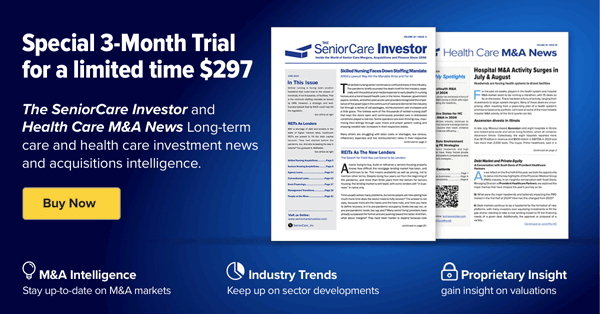The Behavioral Health Care M&A market and industry have experienced one effect from COVID-19 that most other healthcare services have not and that is an increase in patients seeking treatment. The pandemic’s impact on jobs, social interactions and myriad other parts of daily life has caused a great degree of psychological stress on individuals. Both Acadia Healthcare Company (NASDAQ: ACHC) and Universal Health Services (NYSE: UHS) noted increased demand for services in the second quarter of 2020 and are cautiously optimistic about patient volumes in the second half of this year.
Behavioral Health Care M&A activity didn’t stop completely, either. In the first eight months of 2020, deal volume totaled 42 deals, not very far behind the 52 deals that were announced in the first eight months of 2019, when a global pandemic was the furthest thing from deal makers’ minds.
Deal flow reflects the impact COVID-19 had in the first half of the year. A strong first quarter (19 deals announced) gave way to a dismal second quarter (11 deals). Two months into the third quarter, deal volume equals that of the entire second quarter (11 deals). The hottest targets in recent years—autism services, substance use disorder treatment and outpatient programs—are still in high demand.
“The market is open. The challenge is not many opportunities are coming to market,” Burk Lindsey, managing director at Raymond James, noted.
“COVID has temporarily taken the breath out of the market,” agreed Mike Moran, executive vice president at American Healthcare Capital (AHC). Deal flow “feels like it’s slower. Some things are under contract but [closings] have been pushed out.”
Like most other services sectors, behavioral healthcare providers saw a drop in patient volumes beginning in mid-March and into April. Referrals from hospitals declined as emergency room visits slowed to a trickle, and school closures suspended some services, at least temporarily. But as the pandemic wore on, more people began to seek mental health services and those who’d abandoned services began to return. By the end of the summer, patient volumes and billing were approaching pre-COVID levels, sources said.
That return to near normal has many would-be sellers pushing back against a “COVID discount” in pricing their companies. “We’re trying to go into contract with eyes wide open,” Moran added. “We’d rather put the brakes on a deal than to let the buyer devalue the deal because of COVID.”
For private equity firms that have spent the last few years building, 2020 may have looked like a good year to exit. Some hopes were dampened by the failed sale process for BayMark Health Services, a giant opioid treatment company owned by Webster Equity Partners. The firm put BayMark up for sale in September 2019 but pulled it off the market in early January when bids fell short of its hoped-for $1-billion-plus price.
But the PE side of the market showed signs of life. In mid-April, at the height of pandemic’s hospitalizations, TPG Capital announced its $1.2 billion acquisition of LifeStance Health, an outpatient behavioral health counseling service backed by Summit Partners and Silversmith Capital Partners.
While the deal announcement brought hope to some PE sponsors, they’re still cautious. “We’ve counselled our private equity clients to take a wait-and-see approach,” Lindsey said. “You don’t want to be the first one out and not get the 12x to 14x multiple you used to expect.”
Scott Kremeier, director at Houlihan Lokey, sees pent-up demand from private equity firms looking to get into behavioral health. “If [PE firms] don’t have a platform, they’re looking for a segment to get into. It’s still a very fragmented market. They’re seeking sub-$5 million-EBITDA companies and looking to grow them to $50-to-$60 million in EBITDA.”
Another pandemic-caused change has buoyed behavioral health care providers. In March, the Centers for Medicare and Medicaid Services (CMS) loosened its regulations around telehealth. Tele-psychiatry was already an established mode of treatment in behavioral health, particularly for patients in rural areas or those with limited transportation.
Many providers beefed up their telehealth offerings, particularly for patient assessment and outpatient visits usually handled in office settings, as CMS’ reimbursement is the same for telehealth and in-person visits. Acadia, for example, went from offering telehealth services in 40 facilities early in 2020 to more than 100, and the company expects to expand the list further.
“The toothpaste is out of the tube with telehealth. There’s no going back now,” noted Nancy Weisling, managing director at The Braff Group. “Rural telehealth services just exploded. It was already being provided, but many providers converted from clinic and in-home services to telehealth visits.”
Raymond James’ Lindsey says the summer was a busier time than usual because the company had a number of engagements signed up, pre-COVID, with financially stable clients. For the less stable companies, restructuring processes added to the workflow.
Lindsey is looking forward to a busy fall, as well. “Historically, fall is a really busy time. The deal calendar has changed over the years, so a lot more deals come to market when they’re ready, not because of the time of year. But post-Labor Day and the fourth quarter will probably be busy, especially for healthy companies.”
“We’re seeing M&A activity pick up in behavioral health and broadly across health care,” said Houlihan Lokey’s Kremeier. “Most platforms that desired to go out to market in 2020 were sidelined in March and April. Now they’re looking to get a transaction done by year-end.”
AHC’s Moran concurs. “Deals in the fourth quarter will hopefully pick up. Healthcare is massively resilient. Buyers and sellers are still building their businesses.”
For more insight into what lies ahead, join us for “Behavioral Health M&A in the Age of Coronavirus,” our interactive webinar presented on Thursday, September 17, 2020.


